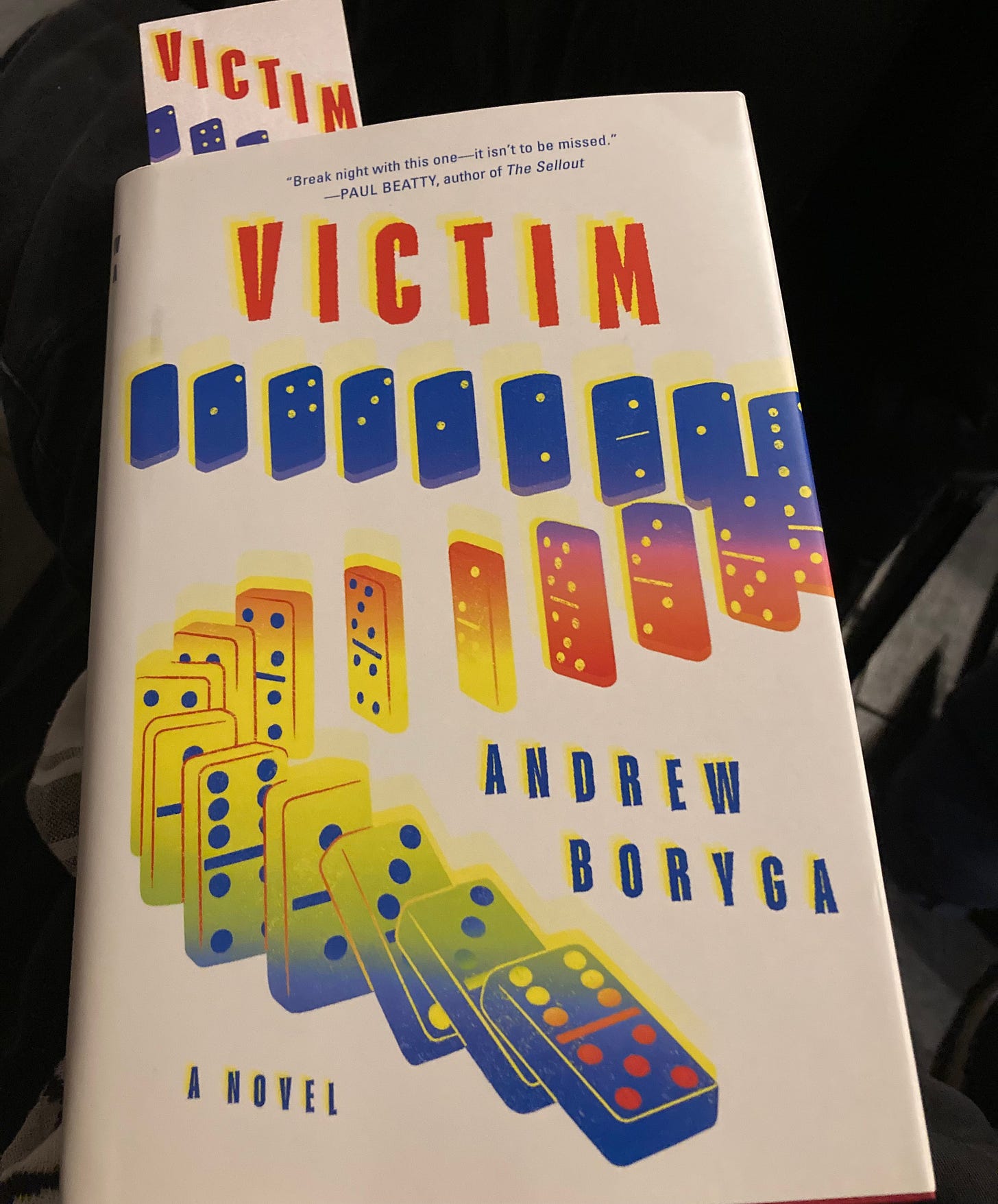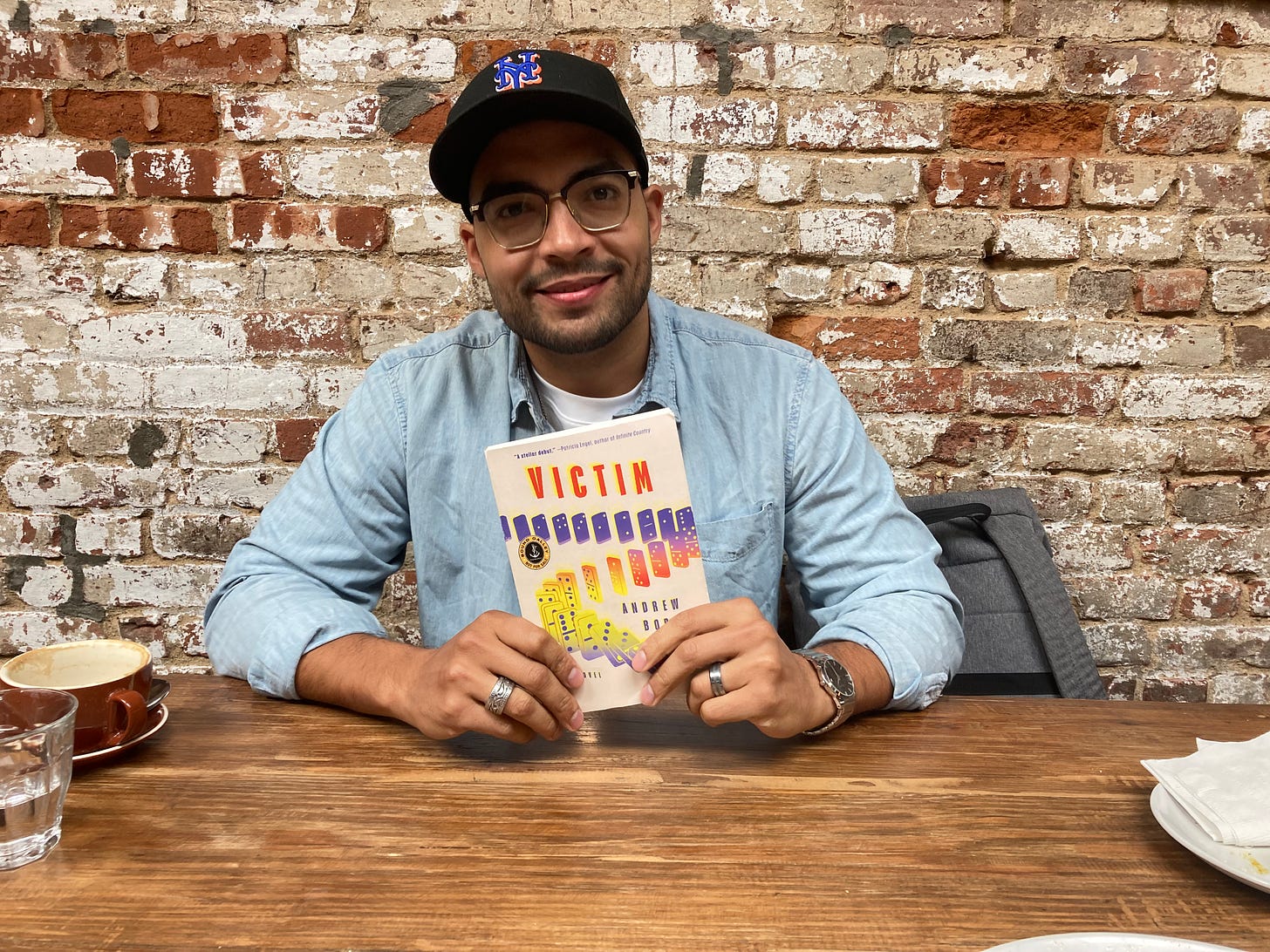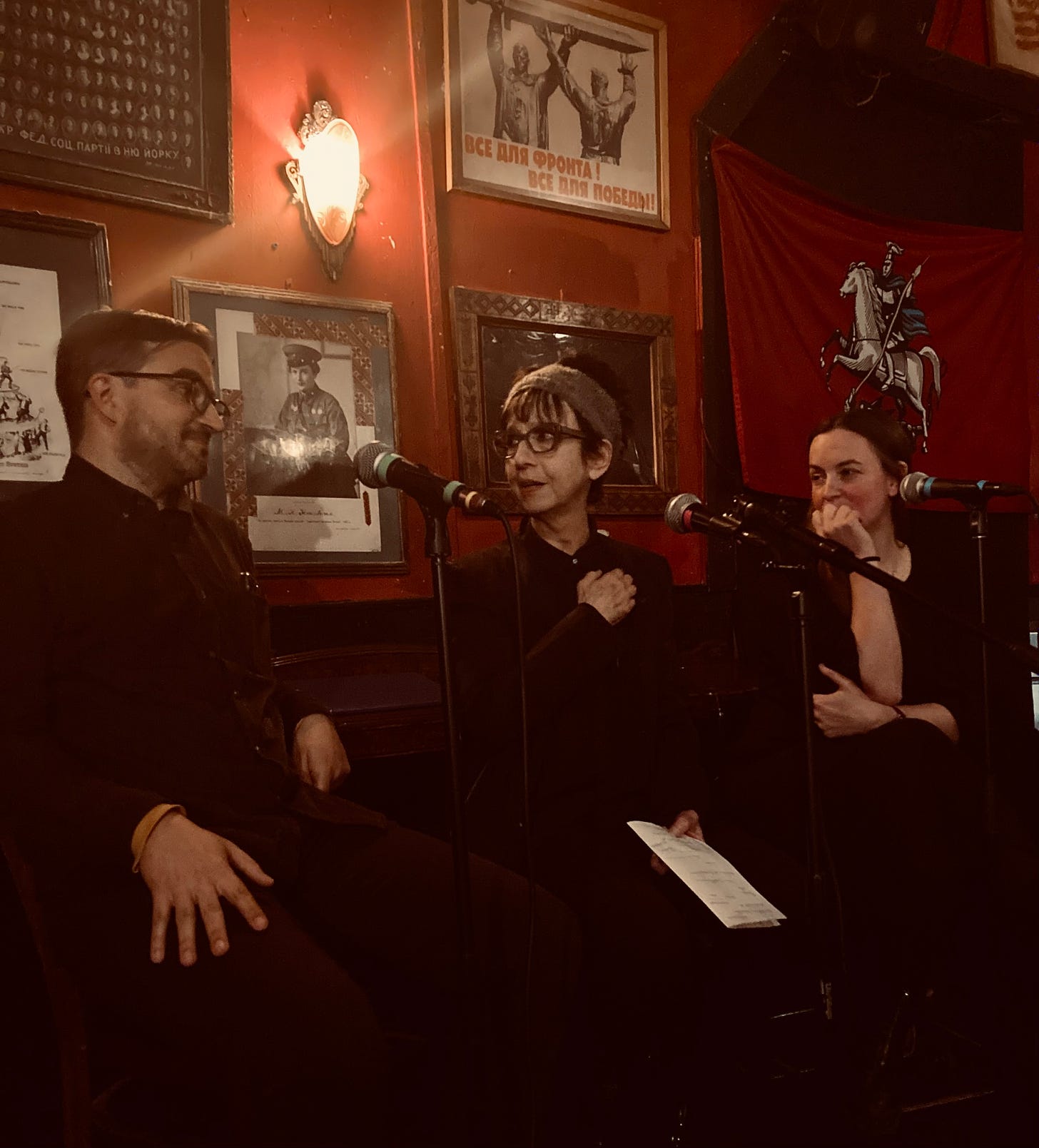Andrew Boryga joins the pod
After long await, Stephen met up with
at Black Forest Brooklyn to discuss his debut novel Victim. Listen to it on Spotify, Apple, or YouTube.Make sure to pick up a copy of the book here. And check out Stephen’s review in The Critic and our friend Valerie Stivers’s review in COMPACT. And click here to follow Andrew’s Substack.
Stephen’s articles published elsewhere:
-a long form essay on the metaphysics and psychology of suburbia:
Many of us privileged snowflakes growing up in suburbia struggle when faced with risks, unpredictability, and challenges that remove us from our comfort zone. We were afforded minimal independence. The general attitude of parents and educators led us to be averse to risk-taking and learning from mistakes. Our forms of socialization prioritized planning over spontaneity, in an attempt to avoid unnecessary friction with family and neighbors. The bureaucratic mentality that taught us to outsource problem-solving to specialized “middle management” figures replaced our creative agency and sense of responsibility. Is it any surprise that suburbia has given rise to infantilized adults in their thirties who, often are afraid to fly from the nest (whether physically or emotionally), are hopped up on anti-depressants, and opt for “partners” instead of committing to a spouse, and end up raising dogs rather than human children?
…
Italian psychoanalyst and philosopher Umberto Galimberti observed a shift in the nature of his patients’ struggles as time has gone on. “Young people today,” he claims, “are not well, but they don’t even understand why…In 1979 when I began working as a psychoanalyst, the problems were grounded in emotions, feelings, and sexuality. Now they concern the void of meaning…provoked by nihilism.” He continues, “they lack purpose. For them, the future has changed from promising to threatening.”[1]
The sense of interior bewilderment is largely the result of the disintegration of the social fabric. As philosopher Mary Spencer has written, “suburbia is a breeding ground for nihilism.”[2] A bureaucratic, atomized “suburban” ethos has become pervasive, regardless of one’s locale. A mentality that offloads responsibility onto distant officials and attempts desperately to sweep the danger, conflict, risk, unpredictability of existence, and ultimately death itself under the rug fosters the illusion that we live in a universe where all risks can be managed, all engagements with reality should be mediated. Everything can be OK. But once you realize that there are wounds which can’t be fully healed, this same mentality begets the opposite idea: That in the end nothing will be OK.
…
As Galimberti cited, the nature of angst among the young today is markedly more existential than that of their parents, as they flock to extremes that toy with more grandiose ontological implications: reactionary or radical-left politics, gender fluidity, anarchism, occultism, traditionalist Catholicism… To flock to such existential fringes can feel as though one is opening the door to refreshing and meaningful questions that lead to a hopeful future, but what is behind those doors can also be hellish. To discern the way out of suburban suffocation without falling into any of the dark pits from which, at the cost of our humanity, it protects us, is difficult.
But we are tired of easy things.
-a hot take on the REAL Benedict Option:
I came to the conclusion that my big ideas, as exciting as they may feel to me at the moment, will never stand the test of time. Following Benedict's method of obedience to the little details God placed in front of him was much more effective and satisfying. Perhaps this is why his charism continues to impact the world 1,500 years after the fact. His method was rooted in his trust in God and not in his personal schemes of changing the world.
With all this talk about The Benedict Option that continues to swirl around Christian circles, I strongly recommend we pay closer attention to Benedict's actual "option." We don't all need to go on pilgrimage to Subiaco to understand it. We only need to be willing to learn from his example and have the humility to trust that praying and working is enough; that what He gives us, what He asks us to say "yes" to, even if it seems mundane and miniscule, is enough to change ourselves and those around us.
-on the wave of young people reclaiming their ethnic roots after their family members assimilated:
Though A.J. Fezza was born in what was once an Italian enclave in Bensonhurst, Brooklyn, his family was one of many who migrated to suburban New Jersey in the 1990s. His parents, children of Italian immigrants, "loved Bensonhurst for its grittiness, nosiness and noise, even if they halfheartedly deny it," Fezza recalls. Although they chose to raise a family in suburbia, Fezza surmises by their heartfelt manner of speaking about the past that the couple "left something behind in Brooklyn."
And so Fezza grew up in Manalapan, New Jersey, among what he considers "whitewashed" Italian Americans. In his eyes, the sprawling landscape of suburbia "put the nail in the coffin" of any hope of maintaining a shared cultural heritage. To Fezza's mind, Italians and others who left their urban enclaves of yesteryear for the comforts of suburbia had chosen de facto to become "generically white."
Finding the nonspecificity of his identity "insufferable," Fezza made a concerted effort to reconnect with his ethnic roots. Learning Italian, visiting relatives in Naples and even affecting a slight Brooklyn Italian accent were means of staving off a self-described spiritual emptiness brought on by assimilation and atomization.
Part of Fezza's cultural experimentation brought him to rediscover his Catholic faith, a tradition from which many of his family members had strayed. Though some of his experimental ethnic affectations eventually fell away, Fezza's esteem for Catholicism stuck, becoming a central part of his life.
Ethnicity seems to have slipped through the cracks of today’s polemics over identity. Immigrants and their offspring have always struggled to navigate the matrix of the "great American melting pot," oscillating between extremes of cultural siloing and assimilation. But the impetus to make a definitive choice about just how much to hold onto one's culture has become less pressing as immigrant families move into their second and third generations. Such an uprooted social imagination unsurprisingly tends to go hand in hand with the loss of faith, and it creates larger scale secularization.
Shout out to Cracks in PoMo contributor
.As followers of Cracks in PoMo are well aware by now, we are very much in favor of the prospect of reclaiming a rooted ethnic identity as well as a brand of ethno-politics as an alternative to the current deadlock between DEI-identitarians of a neoliberal/globalist flavor and so-called “color-blind” libertarians who would have us measure people by solely by “the content of their character.” The ethnic narrative embodies an enchanted, communitarian logic that offers a much needed dose of nuance and vibrance to our currently stale and polemicized cultural discourse.
Blame Theory LIVE
Many Cracks in PoMo contributors and readers were present at the live recording of COMPACT Magazine’s debut of its Blame Theory podcast series featuring
and with guest Avital Ronell. This first discussion explores whether or not we can “blame” the philosophical project of deconstruction for society’s woes. Perhaps one of the most salient moments was when Nina cited deconstruction’s capacity to inject a sense of playfulness into the discourse…a type of playfulness that frightens many more moralistically minded cultural theorists.“There’s something irritating about people enjoying themselves. If you feel bad and see people laughing, their exuberance and energy is felt as an attack. There’s something playful in deconstruction that in an age of neo-moral seriousness and bureaucracy that is anathema.” -
I commented to Dr. Ronell that my first exposure to deconstruction as an undergrad was starkly more rigid and dogmatic compared to the version she advocated for that celebrated “openness to mystery” and nuance. How times have changed…
Check out the recording here and the video here.
Zine Vol. ii
The summer 2024 edition of the zine is in the works. Send us an email or DM if you’re interested in purchasing ad space or if you’d like to help fund our efforts.
Soon you will be able to place your order…stay tuned for details.
Milbank is Back
returns to the pages of Cracks in PoMo, this time, writing about transcending the liberal/fascist polemic with a localist, postliberal narrative that values community, relationships, and the imago dei.The modern sovereign state assumes isolated individuals torn away from their roots and communities, who can only be bound together by their submission to a monopoly of force and power, perhaps further cemented by some sort of shared ethnic identity. The notion of the isolated individual is a fiction and yet the modern state, like the modern market, augments its power by deliberately engineering this isolation–rendering its false founding assumption eventually more and more actually the case…
In the face of the breakdown of the Western system of global order which we see now being played out in Eastern Europe and the Middle East, it can seem plausible to proclaim the return of “realism” after an era of liberal delusion: a return to a supposedly “normal” state of competition between nation-states and of great power rivalry. But realism is not genuine postliberalism: In fact, naked realism is just part of liberalism with respect to its Hobbesian materialist foundations that assumes greedy and fearful individuals and greedy and fearful states as individuals writ large…
The wars to defend Ukraine and to defend Israel remain wars that are truly to a degree about the relative superiority, despite everything, of a liberal democratic order, ultimately rooted in the Western version of the axial that involves a somewhat more socially engaged and relational version of the individual relation to the universal, as opposed to the individual’s contemplative retreat, that could more leave the Oriental social order as indifferent, traditional or conventional…
The West must return to a sense that the aim of both politics and morality is human flourishing as a creative, socially participating and contemplative animal beyond mere freedom of choice or hedonistic satisfaction. Only in this way can its legacy once more hope to command global respect and normativity…
The only alternative to a new repetition of the atrocious dialectic of liberalism and fascism in the contemporary West and across the whole world is for it to recover a sense of its roots in Jerusalem, Athens, and Rome, and their later florescence in adding the dignity of labour to the dignity of participation in political rule and the dignity of religious or philosophical contemplation.
Read more here.








Where can I find the long form essay on the metaphysics and psychology of suburbia - its very compelling. Want to to read the whole thing - thank you!